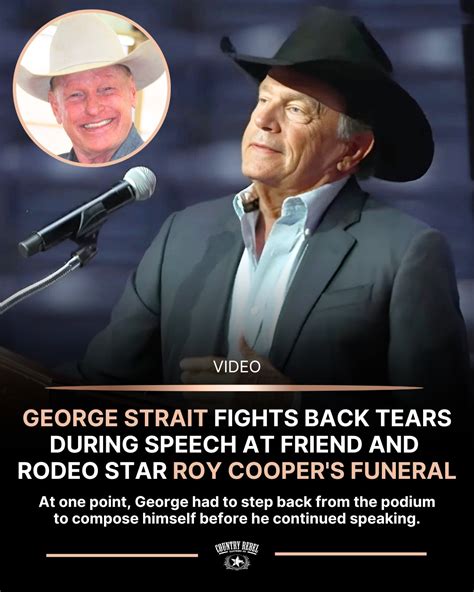
Country music legend George Strait became visibly emotional during his final performance at the recent memorial concert honoring his longtime friend and manager, Erv Woolsey, who passed away in April at the age of 80. Strait, 73, choked up while singing “You’ll Be There,” a poignant ballad about reuniting with loved ones in the afterlife, dedicating the performance to Woolsey and expressing profound sorrow at his loss, saying, “I miss him so much.”
George Strait’s tribute to Erv Woolsey served as the emotional high point of an evening filled with performances by numerous artists who had been touched by Woolsey’s influence and guidance throughout his illustrious career. The memorial concert, held in Woolsey’s honor, celebrated his significant contributions to the country music industry, showcasing the impact he had on the lives and careers of countless musicians. Strait’s performance was particularly moving, underscoring the deep personal bond between the two men and the void left by Woolsey’s passing. The concert served as both a celebration of Woolsey’s life and a moment of collective mourning for the industry.
The sold-out memorial concert at the Moody Center in Austin, Texas, brought together a star-studded lineup that included Garth Brooks, Trisha Yearwood, Kenny Chesney, Eric Church, and many others, all paying homage to the man who played a pivotal role in shaping their careers. Woolsey’s keen ear for talent and his unwavering support helped launch and sustain the careers of some of country music’s biggest names. The event was not only a musical tribute but also a testament to the respect and affection Woolsey garnered throughout his decades in the industry. The atmosphere was filled with a mix of celebratory performances and heartfelt tributes, creating a powerful and emotional experience for both the performers and the audience.
Strait’s performance of “You’ll Be There” stood out not only for its emotional weight but also for its deliberate choice of song. The lyrics, which speak of hope, reunion, and eternal love, resonated deeply with the sentiments of loss and remembrance that permeated the evening. As Strait sang the words, his voice cracked with emotion, and he paused momentarily to compose himself, clearly affected by the memory of Woolsey. The audience responded with an outpouring of support, offering applause and cheers that acknowledged both the beauty of the song and the sincerity of Strait’s grief. The moment was a powerful reminder of the human connection that underlies the music industry, and the profound impact that personal relationships can have on artistic expression.
Woolsey, a towering figure in the country music world, was known for his multifaceted career as a manager, booking agent, and club owner. He began his career in the music business in the 1970s, quickly establishing himself as a savvy and reliable partner for artists looking to navigate the complexities of the industry. His management company, Erv Woolsey Company, represented some of the biggest names in country music, and he played a crucial role in shaping the careers of numerous artists. Beyond his management work, Woolsey was also a successful club owner, operating several popular venues in Texas that provided a platform for both established and emerging artists. His clubs became known as hubs for country music talent, and he was instrumental in fostering the vibrant music scene in the state.
Strait and Woolsey’s relationship spanned over four decades, beginning in the early 1980s when Woolsey, then a club owner in San Marcos, Texas, recognized Strait’s immense talent and took him under his wing. Woolsey not only managed Strait’s career but also became a close friend and confidant. He guided Strait through the ups and downs of the music industry, providing invaluable advice and support along the way. Their partnership was one of the most enduring and successful in country music, and it played a significant role in Strait’s rise to superstardom. Woolsey’s understanding of Strait’s artistry and his ability to navigate the complex world of record labels and touring helped to solidify Strait’s position as one of the genre’s most respected and beloved figures.
The memorial concert was organized as a tribute to Woolsey’s legacy, highlighting the impact he had on the careers of so many artists. Each performer shared personal anecdotes and memories of Woolsey, painting a picture of a man who was not only a shrewd businessman but also a kind and generous mentor. Garth Brooks spoke of Woolsey’s unwavering belief in his talent, even when others doubted him. Trisha Yearwood recounted Woolsey’s early support of her career, recalling his willingness to take a chance on a relatively unknown artist. Kenny Chesney shared stories of Woolsey’s legendary parties and his ability to bring people together. Eric Church talked about Woolsey’s no-nonsense approach to management and his unwavering commitment to his clients’ success. These tributes, combined with the musical performances, created a powerful and moving celebration of Woolsey’s life and legacy.
Strait’s performance of “You’ll Be There” followed renditions of some of his biggest hits, including “Amarillo by Morning” and “The Chair,” which had the crowd singing along enthusiastically. However, it was the emotional ballad that brought the house down, leaving many in the audience teary-eyed. The contrast between the upbeat energy of his earlier performances and the raw emotion of “You’ll Be There” underscored the depth of Strait’s grief and the significance of his relationship with Woolsey. The performance was a testament to Strait’s ability to connect with his audience on a deeply personal level, and it served as a reminder of the power of music to express profound emotions.
The passing of Erv Woolsey has been felt throughout the country music industry, with many artists and industry professionals expressing their condolences and sharing their memories of him. Woolsey was remembered not only for his professional accomplishments but also for his personal qualities, including his generosity, his sense of humor, and his unwavering loyalty to his friends and clients. He was a mentor to many, and he played a significant role in shaping the careers of countless artists. His legacy will continue to live on through the music he helped to create and the lives he touched.
The concert concluded with a group performance of some of Woolsey’s favorite songs, bringing together all the artists who had performed throughout the evening. The finale was a fitting tribute to a man who had dedicated his life to country music, and it served as a reminder of the sense of community that exists within the industry. The evening was a celebration of Woolsey’s life, a tribute to his legacy, and a moment of collective mourning for the loss of a beloved figure. The memory of the concert, and particularly Strait’s emotional performance, will likely resonate for years to come, serving as a reminder of the power of friendship, the importance of mentorship, and the enduring legacy of Erv Woolsey.
Beyond the immediate emotional impact, the event highlighted the evolution of country music management and the crucial role individuals like Woolsey played in shaping the genre. Woolsey’s approach to artist management, which emphasized long-term partnerships and personal relationships, stands in contrast to some of the more transactional models that have emerged in recent years. His success serves as a reminder of the value of loyalty, integrity, and a genuine commitment to the artists one represents.
The memorial concert also offered a glimpse into the close-knit community that exists within country music. Despite the competitive nature of the industry, the event showcased the deep bonds of friendship and mutual respect that connect artists, managers, and other industry professionals. The willingness of so many prominent artists to come together and pay tribute to Woolsey underscored the importance of these relationships and the sense of shared history that binds the country music community together.
The choice of the Moody Center in Austin as the venue for the memorial concert was also significant. Austin has long been a hub for country music, and Woolsey played a key role in shaping the city’s music scene. His clubs provided a platform for countless artists, and he was instrumental in fostering the vibrant and diverse musical landscape that exists in Austin today. Holding the concert in Austin was a fitting tribute to Woolsey’s contributions to the city and its music community.
The event served as a poignant reminder of the cyclical nature of the music industry. While new artists and trends constantly emerge, the legacies of those who have come before continue to shape the genre. Woolsey’s influence will continue to be felt through the artists he mentored, the music he helped to create, and the countless lives he touched. His story serves as an inspiration to aspiring managers and artists alike, demonstrating the power of hard work, dedication, and a genuine passion for music.
In the wake of Woolsey’s passing, many in the industry have reflected on the changing landscape of country music and the challenges facing artists and managers in the modern era. The rise of streaming services, the increasing importance of social media, and the ever-evolving tastes of audiences have created a complex and competitive environment. However, the core values that Woolsey embodied – integrity, loyalty, and a commitment to artistic excellence – remain as relevant as ever.
Strait’s emotional tribute to Woolsey at the memorial concert was a powerful reminder of the human connection that underlies the music industry. It was a moment of shared grief, a celebration of a life well-lived, and a testament to the enduring power of friendship. The memory of that performance will likely linger for years to come, serving as a reminder of the legacy of Erv Woolsey and the profound impact he had on the world of country music. The concert cemented Woolsey’s place in country music history and highlighted the impact of a career dedicated to nurturing talent and fostering meaningful relationships.
The concert also inadvertently underscored Strait’s own legacy. Seeing him visibly moved by the loss of Woolsey served as a powerful reminder of Strait’s own decades-long career and the deep connections he has forged within the industry. The event acted as a microcosm of the broader country music world, showcasing the intergenerational relationships and the passing of the torch from one generation to the next. Strait’s continued presence and influence serve as an inspiration to younger artists, and his willingness to share the stage with them highlights the importance of mentorship and collaboration. The evening was not just a tribute to Woolsey but also a celebration of Strait’s enduring legacy.
The outpouring of support and affection for Woolsey following his death and during the memorial concert also speaks volumes about the importance of character and integrity in the music industry. In an industry often characterized by cutthroat competition and fleeting fame, Woolsey stood out as a man of unwavering principles. His commitment to his artists, his generosity to those in need, and his genuine love for music earned him the respect and admiration of his peers. His legacy serves as a reminder that success in the music industry is not just about talent and ambition but also about character and integrity.
The concert also inadvertently shone a light on the unsung heroes of the music industry – the managers, booking agents, and other behind-the-scenes professionals who work tirelessly to support artists and bring their music to the world. While artists often receive the lion’s share of the attention and accolades, it is the dedicated work of these individuals that makes their success possible. Woolsey was a prime example of this type of unsung hero, and the memorial concert served as a fitting tribute to his contributions.
Moreover, the event highlighted the importance of preserving the history of country music. As the genre continues to evolve and adapt to changing times, it is crucial to remember the individuals and events that have shaped its past. Woolsey was a living link to that past, and his passing serves as a reminder of the need to document and celebrate the stories of those who have made significant contributions to the genre. The concert itself became a part of that history, a moment in time that captured the spirit of country music and the enduring legacy of Erv Woolsey.
The success of the memorial concert also underscores the enduring appeal of live music. In an era dominated by streaming services and digital downloads, the experience of attending a live performance remains a powerful and meaningful one for many music fans. The concert provided an opportunity for fans to come together and celebrate the music they love, while also paying tribute to a man who played a significant role in shaping the country music landscape. The energy and emotion of the live performances created a unique and unforgettable experience for everyone in attendance.
In conclusion, George Strait’s emotional farewell to Erv Woolsey at the memorial concert was a poignant moment that encapsulated the deep personal bond between the two men and the profound impact of Woolsey’s contributions to the country music industry. The event served as a celebration of Woolsey’s life, a tribute to his legacy, and a moment of collective mourning for the loss of a beloved figure. The memory of Strait’s performance, and the concert as a whole, will likely resonate for years to come, serving as a reminder of the power of friendship, the importance of mentorship, and the enduring legacy of Erv Woolsey. The event transcended a simple memorial, evolving into a poignant reflection on the country music industry itself, its history, its personalities, and its future. The memorial concert serves as an important reminder of the impact of individuals like Erv Woolsey, who shape the landscape of the music industry through their dedication, vision, and unwavering support of artists. It highlights the importance of recognizing and celebrating these individuals, ensuring that their contributions are not forgotten. Frequently Asked Questions (FAQ)
-
What was the purpose of the George Strait concert where he became emotional?
The concert was a memorial service honoring Erv Woolsey, George Strait’s longtime friend and manager, who passed away in April at the age of 80. The event served to celebrate Woolsey’s life and contributions to the country music industry. According to the source article, the memorial concert paid homage to the man who played a pivotal role in shaping the careers of some of country music’s biggest names.
-
What song did George Strait perform that caused him to choke up, and why was it significant?
George Strait performed “You’ll Be There,” a ballad about reuniting with loved ones in the afterlife. This song was significant because its themes of loss, remembrance, and eternal love resonated deeply with the occasion, and Strait dedicated the performance to Woolsey. As the rewritten article noted, “The lyrics, which speak of hope, reunion, and eternal love, resonated deeply with the sentiments of loss and remembrance that permeated the evening.”
-
Who was Erv Woolsey, and what was his relationship with George Strait?
Erv Woolsey was a prominent figure in the country music industry, working as a manager, booking agent, and club owner. He is best known for his long and successful partnership with George Strait. The rewritten article described Woolsey as “a towering figure in the country music world,” noting that his relationship with Strait spanned over four decades. Woolsey discovered Strait in the early 1980s and played a crucial role in guiding his career.
-
Which other artists performed at the Erv Woolsey memorial concert?
The memorial concert featured a star-studded lineup of country music artists, including Garth Brooks, Trisha Yearwood, Kenny Chesney, and Eric Church, among others. These artists performed in tribute to Woolsey and shared personal anecdotes about his impact on their careers. As the rewritten article highlighted, “Each performer shared personal anecdotes and memories of Woolsey, painting a picture of a man who was not only a shrewd businessman but also a kind and generous mentor.”
-
What was Erv Woolsey’s overall contribution to the country music industry?
Erv Woolsey made significant contributions to the country music industry through his work as a manager, booking agent, and club owner. He helped launch and sustain the careers of many prominent artists, fostered the music scene in Texas, and was known for his keen eye for talent and his unwavering support of musicians. The rewritten article described him as “instrumental in fostering the vibrant music scene in the state” and noted that his “management company, Erv Woolsey Company, represented some of the biggest names in country music.” He was also praised for his personal qualities such as generosity, humor, and loyalty.








